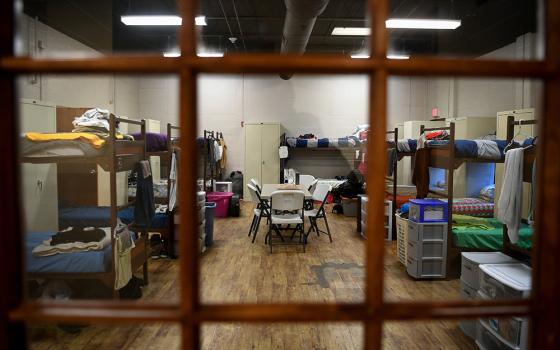In the sacred texts we hear today, Isaiah and the Matthean evangelist offer their understanding of the kingdom of God -- or, as Matthew preferred, the kingdom of heaven. Both of the sacred authors thought of the kingdom in terms of a banquet of rich food and choice wines, prepared by God.

| Twenty-eighth Sunday in Ordinary Time |
| Isaiah 25:6-10a Psalm 23 Philippians 4:12-14, 19-20 Matthew 22:1-14 |
According to Isaiah's imagining, all the peoples of the earth would be in attendance. Matthew tells us that the guest list evolved: After the invited guests refused to come, the servants of the king went out into the streets and gathered into the feast all they found, the bad and good alike.
Through their lives and works, two famous Methodist ministers have left their own commentary on this surprising turn of events -- that of God throwing open the gate to salvation to all.
In his sermons, founder John Wesley is said to have told people that when he arrived in heaven, he would be surprised by three things. First, he would be surprised to see who was there. Second, he would be surprised by who was not, and third, he would be surprised to find himself there. Wesley readily acknowledged that God's ways are not only surprising, but rich in mercy and love for sinners.
As for the other man, his name was William Booth, founder of the Salvation Army (1878), and better known as "General." Booth succeeded in establishing missions that welcomed and served the poor in 58 countries. So gracious was he to those whom society had written off as unsalvageable that he was memorialized in a poem by American poet Nicholas Vachel Lindsay. In "General William Booth Enters Into Heaven," Lindsay wrote of the welcome Booth received from walking lepers, lurching bravoes from the ditches, vermin-eaten saints and unwashed legions with the ways of death.
Indicating that a bass drum, banjoes, tambourines and a flute should be played to accompany the singing of his poem, Lindsay told of bull-necked convicts, big-voiced lasses, and loons with trumpets; all had been warmly welcomed into heaven by God. All were present to welcome the man who had welcomed them, tended to their needs, fed them, given them shelter and, all the while, honored and respected them.
When Lindsay's poem was published in a religious journal by an Anglican clergyman, many were outraged to the extent that the perplexed and surprised minister almost lost his editorial job. As noted in the British Weekly, "The readers of the paper did not like to think that heaven was inhabited by saved sots and converted harlots. They thought it was a respectable colony of blameless and well-to-do brethren. One of these days, they will get the surprise of their lives."
As we pray and ponder the sacred texts this week, we may find that we, too, experience a certain degree of surprise when we become acutely aware of God's limitless capacity to love and forgive. When we realize that those who are counted as the least here on earth are valued beyond measure in God's kingdom, we might alter our perspective and soften our hearts. We might also try to take on the mind of Jesus, to embrace more fully the loving forgiveness of God, to give ourselves more earnestly to the poor, the neglected, the voiceless and the unwanted.
Dorothy Day, who was completely given to God and to God's poor, once said, "Even the lowest, most depraved, we must see Christ in them and love them to folly. When we suffer from dirt, lack of privacy, heat and cold, coarse food, let us rejoice" (quoted by James Forest in Love Is the Measure, Paulist Press, 1986). Day had learned, as Paul did (second reading), to make the best of every circumstance. Surely she could also say with Paul, "I can do all things in him who strengthens me" (Philippians 4:13).
Although I have made mention of this before, I think it bears repeating. Day died on Nov. 29, 1980 (the same year that another champion of social justice, Archbishop Oscar Romero, was martyred for his commitment to God and God's people). Day's funeral Mass was attended by priests and nuns, but also by bag ladies, addicts, beggars, the homeless and all those other poor ones in whom she saw the face of God.
Anyone looking on at those gathered for the feast in today's Gospel, and on those who came together for Day's funeral, might characterize these groups as a motley crew. And so they were; and so we are, a community of diverse members called together by God and graced with the gifts and ability to care for one another. Until the final call to the joys and abundance of eternity, we remain responsible for all God's least ones, who have been entrusted to our keeping.
[Patricia Sánchez holds a master's degree in literature and religion of the Bible from a joint degree program at Columbia University and Union Theological Seminary in New York.]



